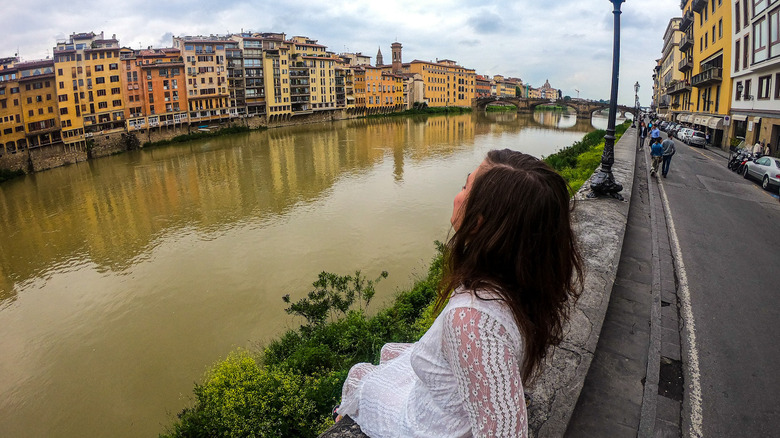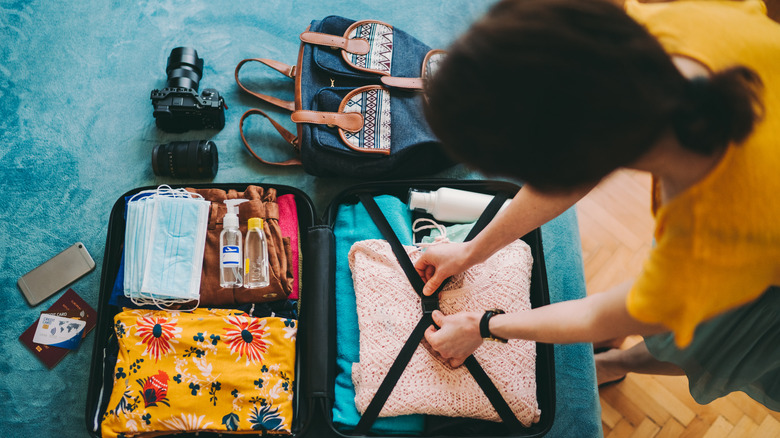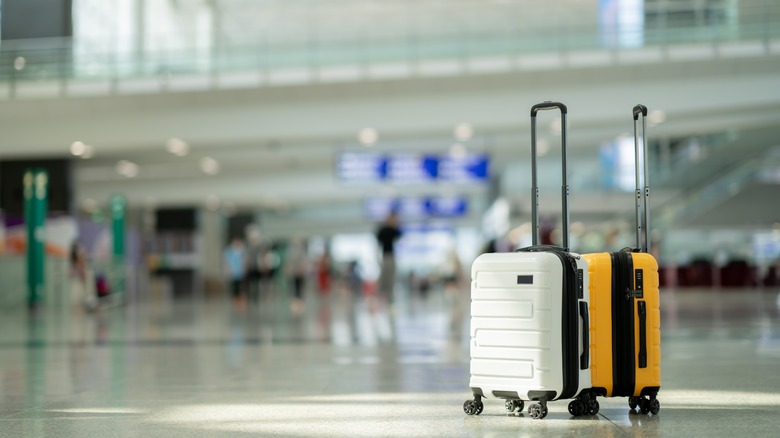Useful Tips To Quit Your Job And Travel The World, According To Someone Who Did It
If you've ever wanted to be one of those radical people who quit their jobs, sold their belongings, and traveled the world, let me be your guide. Why should you trust me? Well, in 2019, I did just that. I was a bartender in New York City, making more than enough money to survive, but I felt stuck in the mundanity of everyday life. In 2016, I took two weeks off work and went on a solo trip to Thailand in search of something new.
During my Thai getaway, I considered my 16 days of travel a long vacation, but I met folks on months 9 and 10 and year 2 of traveling the globe. Where did they call home? How did they financially sustain long-term travel? Where was all of their stuff? The questions in my head were endless, but they introduced me to a life I had never even imagined possible.
Upon returning, I became hyper-focused on doing something similar. I took some of my bartending cash and transferred it to savings, making it the first time I had more than $100 in my savings account. By January 2019, three years after the idea first sparked, I was on a one-way flight to Tahiti, about to embark on the adventure of a lifetime. If you've ever dreamed of leaving it all behind to travel, here are some tips to make it happen.
Marie Kondo your Life
Once I had my mind set on traveling long-term, I began cutting out anything that didn't align with my goal. For example, my apartment lease was up in April 2018, but I had planned to leave in January 2019. Because there was a one-year minimum requirement for resigning my lease, I decided to give up my apartment and rely solely on short-term sublets for the remainder of the year. This led to moving four times in 2018, which was inarguably stressful, but with each move, my belongings dwindled. If I could put a price on something, from my coffee maker to my couch, I sold it. By the end of the four moves, I was down to just two bags of clothes — no furniture, no pots and pans, nothing. It felt freeing.
It's not just physical possessions you need to cut back on, but also general expenses. An iced coffee every day was at least $5, while a can of Colombian coffee from my local bodega was also $5. One was clearly more financially savvy. I stopped saying yes to gatherings with friends and picked up extra shifts at work instead to increase the number in my savings account. It was lonely and often exhausting, but I knew the sacrifice would be worth it. I also deleted all unnecessary apps and some of my favorite subscriptions: Spotify was out, Uber was no more, and all food delivery services were painfully forbidden.
Your starting point will make a difference
The lingering question is, "Where do you want to go?" My plan was nontraditional and flexible. I separated my aspiring destinations into three categories. First, countries I absolutely wanted to visit, examples being Australia, the Philippines, Tanzania, and India. Second, locations I'd do my best to make happen (these were mainly places I had already visited that I really enjoyed, like Italy and Japan). Third, nations that were logistically difficult, but I'd go if I could make it work (Madagascar, Seychelles, and Iran). In total, I had about 50 destinations listed.
In my situation, this meant, logistically speaking, either starting with a country somewhat close to home (like Iceland or Portugal) and working my way around the globe in that direction or vice versa. I liked the idea of starting as far away as possible and working my way back. So I looked at my list, determined French Polynesia was the furthest, and booked a one-way to Tahiti as my starting destination.
However, some travelers might choose to only focus on one region. Backpacking through Europe, Southeast Asia, and Latin America is quite a popular option. In this case, geography should still be considered (if you're curious, London is the best destination to start backpacking through Europe). Overall, look for the best flight deals from your home base to the region. Especially in concentrated areas, moving from destination A to B is often not too difficult.
Get travel insurance
If you think everything will go smoothly, you're in for a rude awakening. Even if you plan everything to a T, your trip might not go as planned while traveling, especially in long-term touring. Even on a regular ol' vacation, issues like lost luggage, delayed flights, and double-booked hotel rooms are risks. So, when you add up all the movement involved, it's safe to assume that somewhere along the way, things will go awry.
While travel insurance can't prevent flight delays and lost bags, it is bound to provide you with options and compensation for unexpected hurdles. You can sign up for travel insurance with companies like World Nomads or Allianz Travel Insurance. Another recommended option is to sign up for a travel credit card with travel insurance. Some of the best on the market are Chase Sapphire Reserve, the Platinum Card from American Express, and Capital One Venture X Rewards Credit Card. While inclusions for insurance vary card by card, coverage ranges from general travel insurance, like interrupted travel plans, to car insurance and even medical emergency assistance.
Travel insurance can also come in handy when embarking on physically demanding activities. For example, since I was planning on hiking Mount Kilimanjaro somewhere along the way, I purchased an insurance plan that included "emergency medical evacuation," which would cover being airlifted and hospitalized. Luckily, I never had to use it.
Be flexible, be patient, and don't overplan
If I had to omit every tip except for one, this would be it. It seemed anytime I had a plan while traveling, the universe laughed in my face, but it taught me a few valuable lessons. Some destinations require more planning. Think of countries requiring tourist visas, locations with limited flights, and hard-to-reach spots like remote islands. However, attempting to plan every minute of every day leaves no room for flexibility. You never know what you'll discover on the road, and word from the wise: Leave room for what speaks to you while traveling.
It might seem unsettling to journey with no plan for onward travel; some countries might even require proof of exit. But a great way to keep your spontaneity exciting as opposed to terrifying is to go on a site such as Skyscanner to widen your scope. Utilize the site's "Everywhere" search tool — simply type your location and filter to "everywhere." You will be presented with a list of destinations arranged chronologically from the most affordable to the most expensive based on your travel dates. Book the cheapest ticket to the next destination to stay on your toes.
Flexibility applies not only to schedules and logistics but also to your mindset. Stay open-minded when it comes to new cultures, experiences, and locations. Ask locals what their favorite meal is and try it. If available, don't skip the top-rated tours for the best food. And above all, practice patience.
The timing will never feel right; go for it, anyway
Walking away from jobs, stability, and familiarity is terrifying. I first had the idea to travel long-term in 2016 and didn't pull the plug until 2019. The thought of what my life could be, exploring the world and learning about new cultures versus what it was, stuck in a mundane routine with little to look forward to, ate at me daily. Luckily, I finally acted on the bickering feeling within.
I had many reasons why I delayed leaving for three years. My sister was engaged, and I didn't want to miss her wedding. I needed more time to save money; my goal was $30,000, and I was nowhere near it. I was in a long-term apartment lease, wasn't ready to sell all of my stuff, wanted a backup work plan, and needed to complete a TEFL course, and so on. It's not that these precautions were terrible; in the end, they made for more stability and contentment once I finally left.
But I could've continued to make excuses to this very day. My savings never hit the $30,000 mark, and I have yet to use my TEFL certification. The timing will never feel perfect, but if you really want this, start taking small steps to inch closer to your goal. It might never feel right, but once you go, the rest will fall into place.





